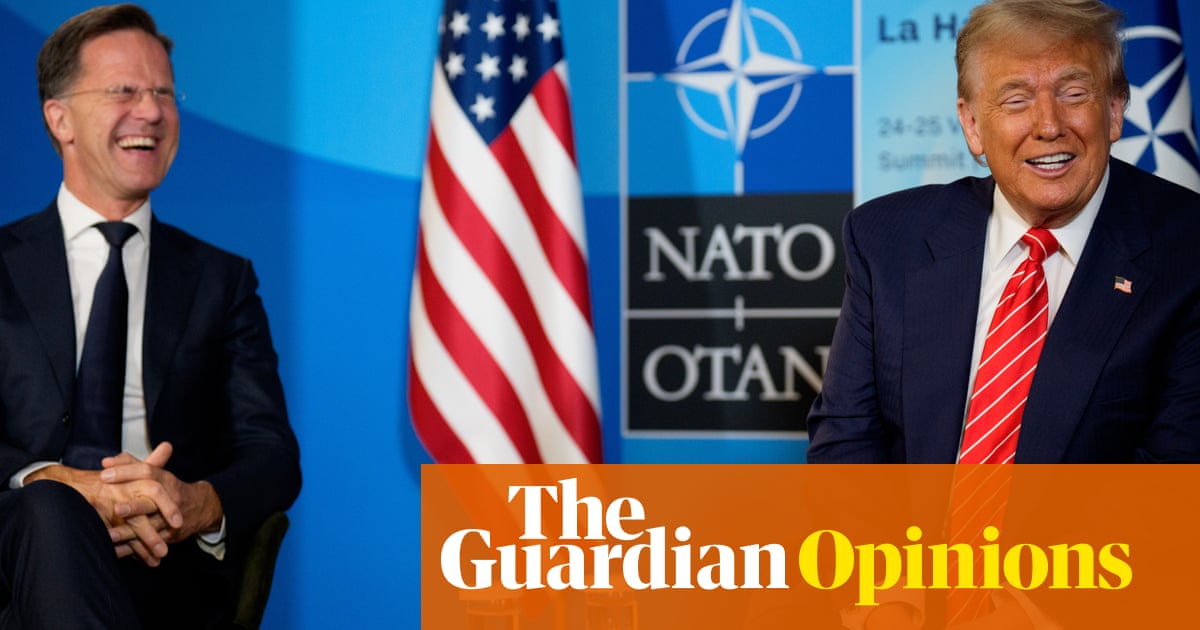Nato’s Hague summit was an orchestrated grovel at the feet of Donald Trump. The originally planned two-day meeting was truncated into a single morning’s official business to flatter thepresident’s egoand accommodate his short attention span. The agenda was cynically narrowed to focus on the defence spending hikes he demands from US allies. Issues that may provoke or embarrass Trump – the Ukraine conflict, or whether the Iranian nuclear threat hasactually been eliminatedby US bombing – were relegated to the sidelines.
Instead, the flattery throttle was opened up to maximum, with Nato’s secretary generalMark Rutte leadingthe assembled fawning. On Tuesday, Rutte hymned Trump’s brilliance over Iran; yesterday, he garlanded him as the vindicated visionary of Nato’s drive towards the5% of GDPspending goal. No one spoiled the party. As the president’s own former adviser Fiona Hill put it yesterday, Nato seemed briefly to have turned into the North Atlantic Trump Organization.
For Rutte and most of the alliance leaders, however, this was 24 hours of self-abasement with a specific goal. The purpose of this first Nato summit of the second Trump presidency was to keep the US as fully on board as possible with the transatlantic alliance. Nothing else mattered. Any repetition of the shocks that JD Vance and Pete Hegseth delivered to Europe at the Munich security conference in February was to be avoided at all costs. In pursuit of that objective, nohumiliation or hypocrisywas too gross.
So, was it mission accomplished for Nato? Maybe yes, judging by Trump’s generally good behaviour in The Hague. The 5% pledge was “very big news”, he announced. The US was still committed to Nato’s article 5 collective-defence doctrine, he appeared to say at his post-summit press conference, though his curious choice of words – “We are here to help them protect their country” – will not reassure everyone. The leaders have nevertheless emerged with what Henry James called “the equanimity of a result”. The Nato summit got what it was designed to get.
But in every longer term way, this appeasement of Trump solves nothing. In political terms the Hague summit does not mark the resumption of normal relationships, let alone the beginning of a newNatogolden age. Such things are not possible in the Trump era. Politically, the summit was a bunker buster dodged. True, things have not got worse, an outcome that many, including Rutte, will regard as a kind of achievement. However, none of Nato’s other preexisting difficulties has been solved. Most remain firmly in place.
Of these, four stand out. The first and most immediate is Ukraine. There has been no change in Trump’s impatience with Ukraine, his belief in a ceasefire or his unwillingness to renew US military aid. But nor can the other Nato members supply the aid that Ukraine needs. So the war grinds on, in part because of Trump. Some believe the war could even become permanent. “Rather than assuming the war can be ended through a comprehensive battlefield victory or a negotiated compromise,” the Carnegie Endowment analyst and former Ukrainian defence ministerAndriy Zagorodnyuk wroteearlier this month, “Ukraine and its allies must plan to build a viable, sovereign and secure state under constant military pressure.” Trump would not be interested in that.
The second difficulty is Trump’s sheer unpredictability. Everything was well choreographed in The Hague, but for how long will this last? No one can say for sure. The world is still absorbing the implications of Trump’s impulsive handling ofIran, in which military action was repudiated in favour of diplomacy one day, before war was launched the next, followed by the proclamation of peace on the one after that. The Iran bombing has reminded the US’s Nato allies of just how little sway they actually possess over the president, and has underscored the difficulty of second-guessing Trump’s actions.
This feeds through into the third problem. The commitment to spend 5% of GDP on defence is a policy goal not a present reality. The UK, for instance, aims to get to5% by 2035, and it will only do so through some jiggery-pokery over what can legitimately be classified as security, as the government’s new national security strategy document, published on Tuesday to coincide with the Nato summit, makes clear.
Ten years is a long time. Much will change. Trump’s successors may be more committed to Nato, or they may be even more unreliable than he is. There could be regime change in other places too. No one knows. Warfare is certain to change, as the drone revolution has shown. Nato needs to be careful not to bring 20th-century assumptions to bear on 21st-century planning. The national security strategy document rightly posits this period as an era of “radical uncertainty”. Yet investors, including investors in high value hi-tech industries such as defence, abhor uncertainty.
Which brings us to the fourth problem. Patching things up with Trump may solve nothing because hemarches to his own drum. But the threats do not go away. This means that the European Nato nations and Canada have to forge a viable system of collective defence against hostile threats that is not dependent on the whims of the person in the White House at every turn. That is a very large task. But Washington cannot have a veto on whether the nations of Europe defend themselves against, say, Russian aggressions.
There is no real choice in the circumstances. The allies are faced with the huge task of gradually reducing their long dependency on the US’s technology and armaments without provoking a complete rupture with the US. At the same time, they must increase their own and Europe’s defence capacity. It is a devilishly difficult course, with which Britain’s political leaders, never mind Britain’s security world, would be profoundly uncomfortable. Yet that is the one on which we are embarked.
Martin Kettle is a Guardian columnist
